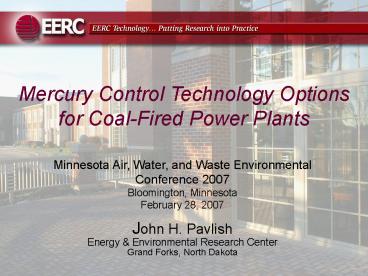Mercury Control Technology Options for CoalFired Power Plants - PowerPoint PPT Presentation
1 / 26
Title: Mercury Control Technology Options for CoalFired Power Plants
1
Mercury Control Technology Options for Coal-Fired
Power Plants
Minnesota Air, Water, and Waste Environmental
Conference 2007 Bloomington, Minnesota
February 28, 2007 John H. PavlishEnergy
Environmental Research CenterGrand Forks, North
Dakota
2
Global Mercury Emissions
Global Mercury Emissions Are Approximately 7000
tons/year
Source Seigneur, 2004 Mason and Sheu, 2003
Lamborg, 2002.
3
Anthropogenic Sources of Global Mercury Emissions
2000
Source Pacvna, J.M. Pacvna, E.G. MEC3 3rd
International Mercury Experts Workshop,
Katowiice, Poland, June 57, 2006.
4
U.S. Emissions of Human-Caused Mercury
Source EPA 1990 NTI and EPA, 1995 1999 NEI.
5
U.S. Electric Generation
Source www.eia.doe.gov/neic/brochure/elecinfocard
.html.
6
World Coal Consumption 2003
Source Energy Information Administration/Internat
ional Energy Outlook.
7
Mercury Emission Perspective
- Mercury Is a Global Pollutant
- Estimated 7000 tons1 emitted worldwide.
- Estimated 4700 tons1 ? from human activities.
- U.S. contribution from industrial sources is
about 120 tons2 (2). - U.S. coal-fired utilities account for about 48
tonsless than 1 of worldwide total mercury
releases.
Based on 1999 ICR Data
2 EPA 1999 NEI.
1 Seigneur, 2004 Mason and Sheu, 2002.
8
(No Transcript)
9
Minnesota MercuryEmissions Reduction Act of 2006
- Requires a 90 reduction at the three largest
coal-fired power plants in Minnesota - Xcel Energy's Sherco and Allen S. King
- Minnesota Power's Clay Boswell
- Two-phase reduction
- Units with dry scrubbers, 2009
- Units with wet scrubbers, 2014
- Emissions will be reduced by 1200 lb
Signed into law on May 11, 2006, by Governor
Pawlenty.
10
What Governs Mercury Emissions and Control?
- Mercury levels and association in the coal
- Coal constituents
- Halogens
- Ash components and quantity
- Sulfur
- Mercury variability in coal
- Mercury forms (speciation) in flue gases
- Mercury concentration in flue gases and synthesis
gases - Existing control equipment installed for NOx,
SO2, and PM
11
Coal Deposits in the United States
Fort Union (lignite) Formation
Appalachian (bituminous) Formation
Interior (bituminous) Formation
Western (sub-bituminous) Formation
Western (bituminous) Formation
PRB Formation
Gulf Coast (lignite) Formation
12
Comparison of Average U.S. Coal Characteristics
13
Variability of Mercury in Coal by State
Source Quick Brill Tabet. Mercury in U.S.
coal?observations using the COALQUAL and ICR
data. Environ. Geol. 2003, 43, 247259.
14
Forms (Speciation) of Mercury Impact Control and
Transport
- Elemental mercury Hg(0)
- Not very soluble
- 12 months up to a year lifetime in atmosphere
- 95 of atmospheric mercury, globally distributed
- Oxidized mercury Hg(II)
- Very soluble
- Can be captured in scrubbers
- Small amount (13) in atmosphere
- Species unknown, HgCl2?
- Short atmospheric lifetime, 1 week
- Locally and regionally distributed
- Particulate mercury Hg(p)
- Bound to particles, not pure
- Can be collected in efficient particulate control
devices - Small amount (13) in atmosphere
- Species unknown
- Relatively short atmospheric lifetime, 12 weeks
- Locally and regionally distributed
Control
15
Low Mercury Flue Gas Concentration Complex
Chemistry and Transformations
1 mercury per 1,000,000,000 parts of flue gas
Removal must occur in 12 seconds
16
Typical Mercury Removal Efficiencies
Typical values based on EPA NODA, ICR data,
field tests, and observations. Some values are
based on single data points and may not reflect
removal for all plants.
17
Mercury Control Technologies under Development
and Field Testing
Baghouse or ESP
Scrubber
Stack
Boiler
18
Complex CarbonMercury Interactions
19
Comparison of EERC Results for Untreated Sorbents
Results for Western Low Rank Coals
20
Comparison of EERC Results for Treated Sorbents
Results for Western Low Rank Coals
21
Leland Olds Station (ESP Data)Field Tests with
ACI and SEA
- 210 MW
- ESPs (2) SCA 320 ft/1000 cfm
- Lignite coal from the Freedom Mine
22
Antelope Valley Station Unit 1 (SDAFF) Field
Tests with ACI and SEA
- SDAFF
- 440 MW
- Freedom lignite
23
Big Brown Station Unit 2 (ESPFF) Field Tests
with ACI and Enhanced ACI
BOP Issues
- ESPFF
- Two 600-MW units
- Blend 70 Texas lignite30 PRB
24
Impact of SO3 Injection on Mercury Control
Without SO3
With SO3
Source Sharon Sjostrom, ADA-ES, DOE NETL Mercury
Review, Dec 2006.
25
Effect of SO3 on Hg Removal
Source www.netl.doe.gov/publications/proceedings
/06/mercury/presentations/Sjostrom_presentation_1
21106.pdf.
26
Contact Information
- Energy Environmental Research Center
- University of North Dakota
- 15 North 23rd Street
- Stop 9018
- Grand Forks, North Dakota 58202-9018
- World Wide Web www.undeerc.org
- Telephone No. (701) 777-5000
- Fax No. (701) 777-5181
Presentation available at www.undeerc.org/catm/ind
ex.html

